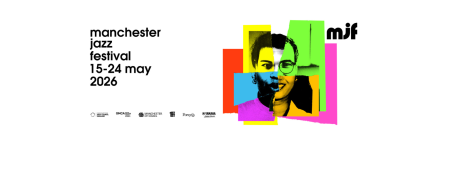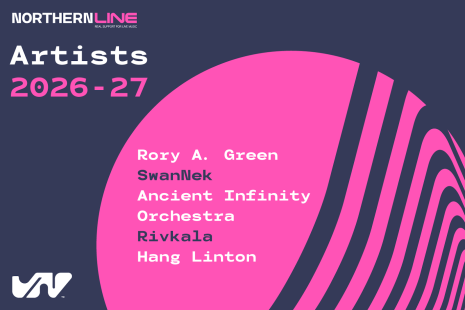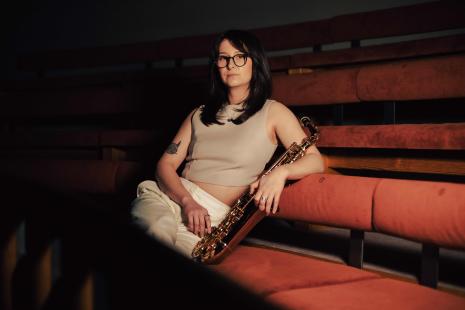

Jazzfest Berlin is moving back! From silent green to the Festspielhaus, from Johannesburg, Cairo, New York and São Paulo to Berlin and from the virtual realm of the internet to the resonant physical space of the here and now. After two hybrid festivals, we have been enriched by new partnerships all around the Atlantic and new artistic formats. However, we are also delighted finally to be able to invite you back to the freshly renovated Haus der Berliner Festspiele, the Pierre Boulez Saal, the nearby clubs A-Trane and Quasimodo and to the Kaiser-Wilhelm-Gedächtnis-Kirche for the 59th edition of Jazzfest Berlin.
In keeping with the dialectical current of a genre that has always been marked by migration, change and dialogue, the artistic encounters at this year’s festival feature meetings between young and old, tradition and renewal, continuity and disruption and a plurality of cultures. One aspect of this collaboration can be seen in the original combinations of jazz, improvisation and traditional folk music. During a year in which folkloric art forms have often been exploited for war propaganda, we want to make a positive counter statement and have invited a number of European improvising musicians to explore folk music traditions from (mainly Eastern) Europe and around the Black Sea in a series of international co-operations. Young artists working across genre boundaries such as the pianist Kateryna Ziabliuk (KOMПOUSSULĂ, Shadows of Forgotten Ancestors), the vocalists Maryana Golovchenko (Shadows of Forgotten Ancestors) and Olga Kozieł (Lumpeks), and the musicians Sanem Kalfa, George Dumitriu and Joachim Badenhorst (Black Sea Songs) prove just as convincingly as the experienced instrumentalists John Surman, Lucian Ban and Mat Maneri (Transylvanian Folk Songs) in their musical response to field recordings by Béla Bartók that tradition is best kept alive not by isolation and preservation but through cultural dialogue and being open to change.
In addition to this, established greats of the US avant-garde scene such as Craig Taborn, Kris Davis, Hamid Drake, Tomeka Reid and Matana Roberts will be joined by new faces and voices including Isaiah Collier, Immanuel Wilkins and Ben LaMar Gay making their Jazzfest Berlin debuts. These musicians, many of whom are influenced by the Chicago scene and make more or less direct reference to the tradition of spiritual jazz or the cultural heritage and creative spirit of the AACM (Association for the Advancement of Creative Musicians), will encounter artists such as the Johannesburg collective The Brother Moves On and the quartet led by South African drummer Asher Gamedze. This will highlight links with the history of South African jazz, such as the spiritual dimension and close historical connection with processes of cultural identity and liberation movements that are explored in greater detail in the Digital Guide to this year’s festival.
While decidedly unspiritual, Sven-Åke Johansson would like to see the European free jazz movement of the 1970s understood as an artistic liberation in the wake of the “classical” American tradition. Johansson and his fellow campaigners at the time – of whom Peter Brötzmann and Alexander von Schlippenbach will also perform at this year’s festival – used free improvisation, openness to experimentation and a physical-material approach to sound to liberate jazz from the predominant musical parameters that were then considered restrictive, and some historical and political connotations that could hardly be transposed authentically to a European context. In doing so, they introduced their own tradition of disruption and transgression which paralleled and intersected with other artistic developments in Europe in challenging our aesthetic expectations. In light of this, Jazzfest Berlin 2022 will spotlight Sven-Åke Johansson’s multifaceted life’s work – which reaches far beyond the boundaries of the genre and music in general - with several concerts, a film presentation, texts and illustrations in the Digital Guide and in the festival’s supporting programme.
To this day, the improvisatory moment in European creative music has been driven by an experimental impulse aimed at innovation and expansion as well as a pronounced inclination towards a demonstrative defiance of the boundaries of musical genre and social milieu. Improvising musicians from Estonia to Norway, and from the Netherlands to Portugal and Greece such as Kirke Karja, Mette Rasmussen, Sun-Mi Hong, Gard Nilssen, Rodrigo Amado and Evi Filippou will leave no doubt about this at their concerts in Berlin.
This thrill of transgression can be experienced in particularly vibrant form when musicians from the Umlaut collective based around Paris and Berlin bring members of the audience out of the auditorium and onto the remodelled stage for their “Umpire Jumble”. This will not only include European improvisation art at its best but also a swinging big band to dance along. With simultaneous performances on two other stages in the Upper Foyer and the Kassenhalle, featuring the young percussionist and experimentalist Camille Émaille, the pianist Lisa Ullen, the duo Silvia Tarozzi & Deborah Walker, the multi-talents of the band Synesthetic4 and other European improvisers “Playing the Haus”, we invite you to lose yourself in the Festspielhaus and simply let yourself be guided by the musical vibes from the various different stages.
Finally, there is also a chance to stroll around and make discoveries in our neighbourhood walk on Sunday, which opens the final day of the festival with intimate concerts in a bookshop, a gallery and a wine shop close to the Festspielhaus. In addition to this cherished pre-pandemic tradition, thanks to our media partnerships with ARD radio stations and Deutschlandradio, you can also listen to Jazzfest Berlin on the radio again this year.
Celebrate music in its many forms and the thrill of new experiences in live concerts, discussions and film screenings at Jazzfest Berlin 2022. We are looking forward to welcoming you!
Nadin Deventer
Artistic Director Jazzfest Berlin
Berlin, September 2022



